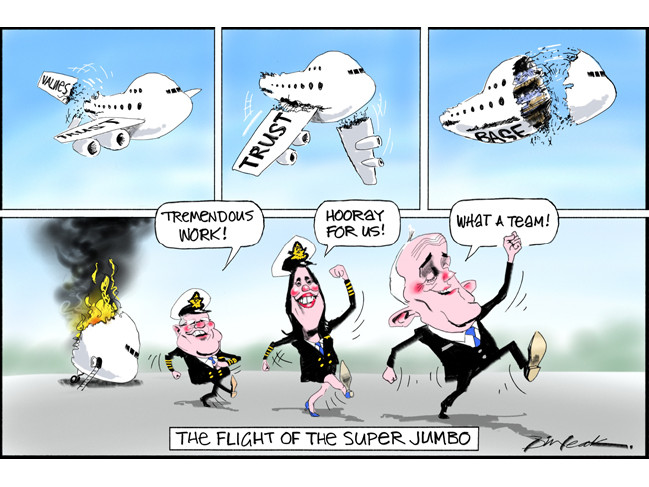Australian Financial Review
5 October 2016
John Wasiliev
It’s another change to superannuation rules arising from the government’s 2017 super reforms that is almost certain to be unpopular with savers.
Where smart investors with SMSFs have organised either a reversionary pension or established a death benefit nomination to ensure their super pension is transferred smoothly to a partner, it will be infinitely more complicated from July next year if the transfer of the benefit pushes the beneficiary’s pension account above the proposed $1.6 million tax-free limit.
A reversionary pension is an income stream that automatically reverts to a spouse on the death of a member.
The current super rules are sympathetic when it comes to pensions being passed to a beneficiary, such as a spouse.
Under the current rules, the tax-free investment earnings on any pension benefits inherited from a deceased partner are maintained in exactly the same way, regardless of the size of the pension that is being transferred.
But from July 1 next year, if the value of the pension results in the size of the combined pension exceeding the government’s $1.6 million tax-free pension limit, it will be a different ball game.
There will be a requirement for any amount greater than $1.6 million to be transferred to an accumulation account. Where this does not happen the government will impose penalties that are reminiscent of the punishments levied not so long ago when members exceeded the after-tax super contribution limits.
It is a change that is likely to be challenging for SMSF members with existing pensions and who have based their retirement and estate planning arrangements on the current rules.
Daniel Butler of DBA Lawyers notes that the proposed change will reduce the tax effectiveness of super pensions and have a major impact on succession planning strategies.
In particular, many couples will not like the fact that their deceased spouse’s reversionary pension gets “retested” to a surviving spouse where the surviving spouse is subject to only their own $1.6 million personal balance cap.
Butler predicts this will be a major issue that is likely to arise in submissions.
Six-month grace period insufficient
Although the legislation allows a period of six months to make a decision on how to handle a reversionary pension if it pushes the beneficiary’s pension account above $1.6 million, typically a surviving spouse suffers years of grieving following the loss of a loved one.
The new rules mean that couples will need to revisit this aspect of their retirement planning, familiarise themselves with the changes and then consider how they will deal with them.
Those already in retirement who have their private pensions and death benefit arrangements in order will arguably be hardest hit because of the lack of grandfathering.
No grandfathering means existing super arrangements won’t be granted any concessions from July 1.
To ensure a beneficiary is automatically entitled to the pension on the member’s death, the nomination of the reversionary beneficiary generally needs to be in place at the commencement of the original pension.
While that’s fine under the current rules, this will need to be reconsidered after July 2017 if the transferred pension is likely to take a beneficiary’s total pension above the $1.6 million limit.
Different strokes
An interesting aspect of the draft legislation is that the six-month adjustment period is available only where the transferred amount is a reversionary pension.
There is no mention in the legislation, says Dixon Advisory’s Nerida Cole, of the amount of time available where the excess in the pension account is caused by a death benefit income stream.
A death benefit income stream is an income stream commenced for an eligible dependant, such as a spouse, as a result of a valid binding death nomination by a deceased member that specifies that a death benefit is paid as a pension to the beneficiary.
There is no reason for the difference, Cole argues.
Both recipients of reversionary pensions and death benefit income streams will need time to adjust to their new circumstances.
At present most people in an SMSF regard their fund as a joint pool. From July 1 individual accounts in an SMSF might need to be considered separately if there is any prospect of a member exceeding the $1.6 million private pension limit.
Risk of penalties
If the death benefit income stream is not given the same six-month window of adjustment, people will risk being penalised from the day that money is received in the surviving spouse’s name if they don’t act immediately, says Cole.
Having to make adjustments to get back under the $1.6 million limit is likely to be stressful for people in this situation.
The penalty regime for anyone who finds themselves exceeding the $1.6 million limit is a 15 per cent individual tax penalty on the notional earnings of any excessive amount that remains within the pension phase.
These notional earnings are calculated at a much high rate than a fund’s expected investment return. The notional earnings are considered to be 7 percentage points above the 90-day bank bill rate – the Reserve Bank’s benchmark indicator for short-term interest rates.
During the 2015-16 financial year this interest charge averaged 9.2 per cent per annum.
Where a member happens to exceed the limit on more than one occasion, they could end up paying 30 per cent tax on the notional earnings.


